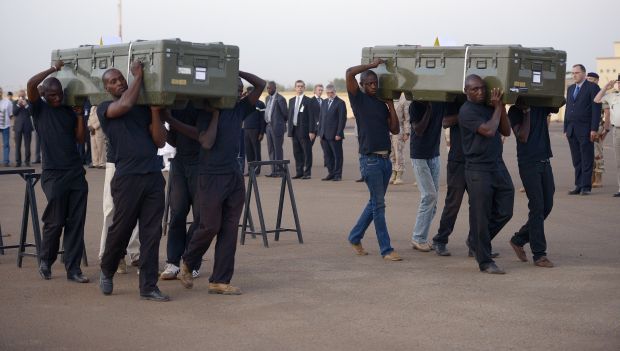
Soldiers carry the coffins of the Radio France Internationale (RFI) journalists who were killed by suspected terrorists on November 2, 2013, at the Bamako airport on on November 4, 2013.(AFP PHOTO/PHILIPPE DESMAZES)
The recent killing of two French reporters in northern Mali highlighted the dangers for expatriates working in the Sahel, the arid region of north-central Africa south of the Sahara desert. Ghislaine Dupont and Claude Verlon were abducted by gunmen on November 2, 2013. After a short chase by French army patrols, the reporters were shot dead by their captors and their bodies abandoned. Al-Qaeda in the Islamic Maghreb (AQIM), the main terrorist group in the Sahel, later claimed responsibility for the killings.
The murders came several days after AQIM released four French hostages in Mali, three years after they were kidnapped. According to Le Monde, French intelligence agents handed over a ransom of more than 20 million euro (27 million US dollars) for their release, though the French government denied that any “public funds” were paid to the kidnappers. This may be strictly true; in an interview with L’Express, Dorothée Moisan, author of a book on the business of kidnapping, claimed that it was probably the hostages’ employers, the nuclear energy firm Areva and the construction company VINCI, that paid the ransom with the tacit approval of the French government.
It must be particularly galling for the 3,000 French soldiers still operating in Mali to know that their adversary is being financed by ransom money from their own country. But it shows that the political economy of kidnapping is alive and well in the Sahel. Like piracy off the Somali coast, hostage-taking has proved lucrative for its practitioners. Britain’s Foreign and Commonwealth Office estimates that around thirteen Western hostages are currently being held in and around the Sahel. The number of hostages is tiny, but the potential rewards are huge.
Western firms and governments have a long track record of paying ransoms in the region. The German government is alleged to have paid a ransom of nearly 5 million euro (5.5 million US dollars) to resolve the first major hostage crisis in the region—a series of tourist kidnappings in southern Algeria in 2003. The success of the operation whetted the appetite of terrorist groups and criminal gangs for hostage-taking; estimates suggest that over 90 kidnappings of Westerners have taken place in the region since 2003.
Enormous sums of money have been handed over. The Associated Press reported that 700,000 euro (1 million US dollars) was paid for the release of a Canadian diplomat in 2009—a figure that the AQIM leadership apparently regarded as way too low. The numbers have only increased since. In August 2010, the Spanish newspaper El Mundo claimed that a ransom of between 5 and 12 million euro (6.4 and 15.4 million US dollars) was paid for the release of two Spanish nationals. In July 2012, an AQIM splinter group claimed that it had received 15 million euro (18.6 million US dollars) in exchange for three aid workers seized near Tindouf in southern Algeria. These examples only scratch the surface of the issue. A former US ambassador to Mali estimated that nearly 90 million US dollars was paid by European governments in ransoms between 2004 and 2011.
In contrast, some governments have an explicit and well-publicized policy of non-payment of ransoms. The US and the UK have been the staunchest advocates of non-payment, arguing that payment to terrorists is counterproductive and illegal. The results of this policy are brutally clear: according to the Foreign and Commonwealth Office, nine British hostages have been killed by their captors in the Sahel region since 2009. As Dorothée Moison has said, “If you get kidnapped by Al-Qaeda and you have a British passport, then you’ve got a strong risk of eventually being decapitated.”
Yet ransoms constitute the principal source of income for AQIM. At a time when Western businesses are burdened with complex laws and regulations to combat terrorist financing, one of the world’s most dangerous terrorist groups is being directly financed by Western companies and governments, acting with full knowledge of their own intelligence agencies. As long as this situation goes on, the threat from Al-Qaeda in the Sahel will only continue to grow.
The article was originally published in The Majalla.
All views expressed in this blog post are those of the authors and do not necessarily represent the views of, and should not be attributed to, The Majalla magazine or Asharq Al-Awsat newspaper.
